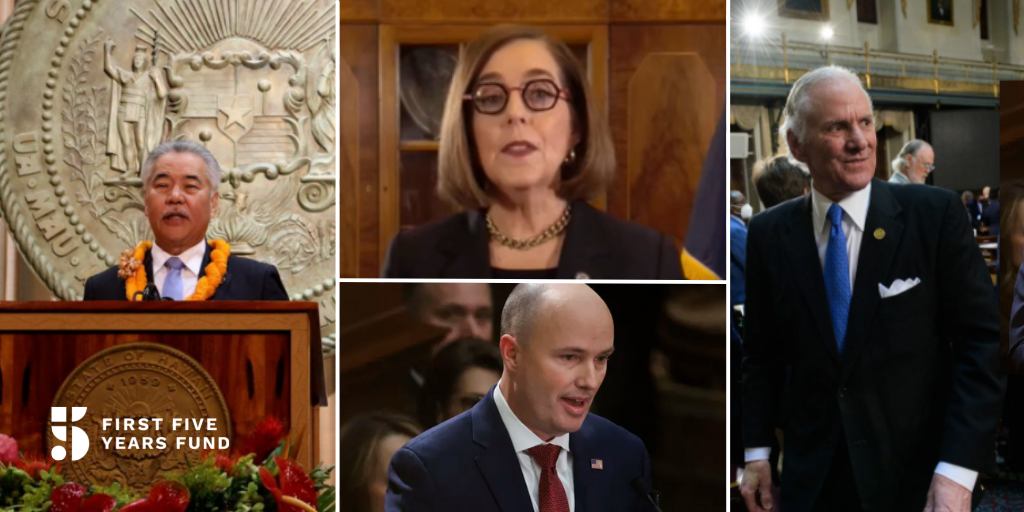Governors Highlight Child Care As Key To Helping States Recover And Grow

For years, Democratic and Republican governors alike have prioritized early learning and care as a smart investment for their states. It’s no surprise, then, that as America faces an ever-worsening child care crisis that has had a crippling impact on economic recovery, Red- and Blue-state governors across the country are continuing to use their annual State of the State addresses to underscore the essential role of early learning for families and our economy, and to highlight the work they’re doing to effectively leverage federal child care relief funding.

FFYF compiled and analyzed all transcripts from the governors who have delivered addresses thus far (37 or two-thirds) and found that half have devoted critical sections of their remarks to the importance of investing in child care and early learning.
Of those governors who specifically mentioned early childhood education as a critical priority:
- 66% highlighted that investing in and expanding child care is one of the best ways to get parents into, or back into, the workforce and help the economy;
- 61% detailed or acknowledged the urgent need for a plan to create affordable access to child care;
- 61% identified child care as a key sector to helping states overcome economic losses specifically related to the COVID-19 pandemic;
- 50% specifically pointed to funding or creating quality pre-K programs as a critical way to invest in the future of their state;
- And 1 in 5 detailed how critical emergency federal funds were to helping working families and the child care sector weather the pandemic.
The key take-away: Regardless of state, political leaning, or geographical location, America’s governors understand that child care is key to helping their communities recover and grow.
First Five Years Fund (FFYF) Executive Director Sarah Rittling issued the following statement on this year’s analysis:
“Child care and pre-K have proved to be a rare, unifying priority for both Democratic and Republican leaders for years. This year’s State of the State speeches continue that long tradition, with bipartisan governors from across the country affirming their commitment to improving access to high-quality early learning and care options. It’s clear that in any state, from South Carolina to Hawaii, leaders know these are smart investments for parents, children and their states’ economies.”
Here’s what governors from across the country are saying about the importance of child care and early learning:
Gov. Kate Brown (D-OR): “To invest in an education system that truly serves Oregon children from cradle to career, we expanded early learning programs as well, so that more rural families, families of color, and those with low incomes would have access to Pre-K in the critical early years of brain development.”
“One thing we know people need in order to get back to work is consistent and accessible child care. Child care is a basic necessity –– it is just as critical to our economic recovery as infrastructure. For working parents, child care is infrastructure. That’s why, alongside Future Ready Oregon, I’m working with the Legislature to pass a $100 million investment that will expand child care access to serve more families, and provide professional learning opportunities and higher compensation to develop and retain our providers. I will also continue to advocate for additional federal investments in our youngest, so we can ensure that every family has access and every single child has care.”
Gov. John Carney (D-DL): “We provided more than $400 million in support to small businesses. We supported child care providers, who stayed on the job throughout this crisis. We know that nationally, and in Delaware, small businesses drive job creation. At the same time, we invested more than $400 million in pandemic relief dollars to shore up businesses hardest hit by the pandemic – like bars and restaurants, museums, child care centers, and hotels.”
Gov. Spencer Cox (R-UT): “Tonight, I am proposing a new position that will make Utah parents and children its singular priority. We currently have programs focused on providing necessities for families that are poor or in need, but we must do more to make sure families of all shapes and sizes and makeups are thriving, including parental leave, access to high-quality child care and mentoring opportunities for parents. The purpose of this office is not to inject more government into families — it is the exact opposite: It is to make sure that government policies are not harming families and that we are coordinating government services to help parents and children succeed.”
Gov. Kathy Hochul (D-NY): “To help parents get back to work, we’re going to expand access to affordable child care to 100,000 more working families and invest $75 million in childcare worker wages.”
Gov. Eric Holcomb (R-IN): “So, herein lies our most pressing challenge. With more than 150,000 current job openings posted and a record number of new jobs coming, we need to ensure all Hoosier students and workers can, and will, fill them. Those efforts start early in life, so we must strengthen both the quality and access to early learning opportunities all across Indiana from birth to age 5 to better prepare students for kindergarten and everything beyond it.”
Gov. David Ige (D-HI): “The pandemic also highlighted the need for child care for working families and how it is essential for many to continue to hold jobs. To help them, the state’s Child Care Program Office is distributing nearly $80 million to support access to child care and provide much needed relief for young families. These funds will support child care businesses weathering the challenges of the pandemic, and can be used for personnel costs, training, rent, mortgage, utilities, supplies, and equipment related to COVID-19.”
Gov. Janet Mills (D-ME): “I want us to do everything we can for families like these all across our state to allow them to stay in Maine and to succeed in Maine. 7 We know that lack of quality affordable child care prevents people from taking jobs, from starting new businesses, from moving to rural communities, and it deprives kids of important developmental care.”
Gov. Henry McMaster (R-SC): “I proposed that we unleash the free market and expand access to full-day kindergarten for every lower income, four-year old child. Parents should be able to choose the public, private, or for-profit childcare provider that best suits their child’s educational needs. Today, we have fully funded full-day, four-year-old kindergarten programs for every Medicaid-eligible child in South Carolina. As a result, the Education Oversight Committee reports that 4K enrollment has increased 47% or by 4,600 children. There are 50 new private, nonprofit, and faith-based providers who have opened 66 new 4K classrooms. In our public schools, there are 120 new 4K classrooms. In a recent survey by First Steps, two out of three parents reported that enrolling their child in First Steps 4K also allowed them to go to work or continue their own education.”
Gov. Phil Murphy (D-NJ): “Many of our residents are getting back to work because of our direct and critical investments in tens of thousands of small businesses – $800 million for retail stores, restaurants, arts and cultural institutions, child care providers, and more – to ensure their survival through some very dark times.”
Gov. J.B. Pritzker (D-IL): “The COVID-19 pandemic has presented us with a challenge the likes of which we have not seen in generations. It has brought families to their breaking points – with parents especially struggling every day to try and make the right decisions for their children as well as their own parents and grandparents. COVID has forced a true reckoning about what it means to work and what it means to live – no matter what kind of job you are holding down. Every worker in every profession is demanding a rethinking right now of the sacrifices they are being asked to make. Every working parent is navigating how to hold Zoom calls with a toddler screaming in the background or facing the impossible choice between going to their hourly job or staying home with a sick child.”
Gov. Phil Scott (R-VT): “As I have said many times, if we build the strongest Cradle to Career education system in the country, it will be one of the best economic development tools we could ask for. And this means looking beyond a preK-12 system. We have worked together to increase the State’s investment in childcare by over 30% since I took office. To build on that, I will propose changes to our Childcare Financial Assistance program to increase access to quality care and learning. You can expect proposals on my end to be geared towards workforce. Because whether it is training and recruitment, child care, tax policy, housing, healthcare, infrastructure, or climate change, we must reverse our workforce trends.”
Gov. Gretchen Whitmer (D-MI): “We expanded access to high-quality child care, and now over 1 in 3 children in Michigan 12 and under are eligible for low or no-cost child care.”
Subscribe to FFYF First Look
Every morning, FFYF reports on the latest child care & early learning news from across the country. Subscribe and take 5 minutes to know what's happening in early childhood education.



